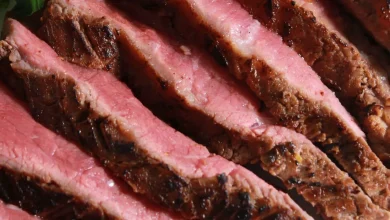Nutritious Rye Bread: Health Benefits, Ingredients & Nutritional Information
Rye Bread Nutritional Information
Rye bread is a popular type of bread made primarily from rye flour, offering a robust and slightly tangy flavor that enhances any meal. Packed with various nutrients, rye bread is an excellent choice for those seeking a hearty and nutritious option.
Nutritional Breakdown per 100g Serving:
| Nutrient | Amount |
|---|---|
| Energy | 259 kcal |
| Protein | 8.5 g |
| Total Fat | 3.3 g |
| Saturated Fat | 0.626 g |
| Carbohydrates | 48.3 g |
| Fiber | 5.8 g |
| Sugar | 3.85 g |
| Calcium | 73 mg |
| Iron | 2.83 mg |
| Magnesium | 40 mg |
| Phosphorus | 125 mg |
| Potassium | 166 mg |
| Sodium | 603 mg |
| Zinc | 1.14 mg |
| Copper | 0.186 mcg |
| Manganese | 0.824 mg |
| Selenium | 30.9 mcg |
| Vitamin C | 0.4 mg |
| Thiamine (Vitamin B1) | 0.434 mg |
| Riboflavin (Vitamin B2) | 0.335 mg |
| Niacin (Vitamin B3) | 3.805 mg |
| Vitamin B6 | 0.075 mg |
| Folate (Vitamin B9) | 51 mcg |
| Vitamin B12 | 0 mcg |
| Vitamin A | 0 mcg |
| Vitamin E | 0.33 mg |
| Vitamin D2 | 0 mcg |
Allergen Information:
Rye bread contains gluten, so it is not suitable for individuals with celiac disease or gluten sensitivity. It may also contain traces of other allergens depending on the specific recipe, such as wheat, soy, or dairy.
Dietary Preferences:
- Vegan-Friendly: Rye bread is typically plant-based, but always check the ingredients list to confirm that no animal products like milk or eggs are used.
- Vegetarian-Friendly: This bread fits into vegetarian diets, as it does not contain meat or fish.
- High Fiber: Rye bread provides a good amount of fiber, supporting digestive health and keeping you feeling full longer.
- Low in Saturated Fats: With just 0.626g of saturated fats per 100g, rye bread is a heart-healthy choice.
Advice:
For those seeking a nutritious addition to their meals, rye bread can be a great option. Its higher fiber content compared to white bread makes it more filling, while its lower glycemic index helps to manage blood sugar levels. It pairs wonderfully with a wide variety of toppings, from classic butter and cheese to fresh vegetables or spreads like hummus. Additionally, rye bread’s slightly sour flavor adds a unique twist to sandwiches, making it a versatile option for different culinary preferences.
Conclusion:
Rye bread is not just a flavorful bread option but a nutritional powerhouse. Its rich composition of proteins, healthy fats, and essential vitamins and minerals makes it an excellent choice for those seeking a balanced and wholesome bread option. Whether enjoyed as a sandwich base or toasted with your favorite toppings, rye bread is a great way to nourish your body while satisfying your taste buds.








